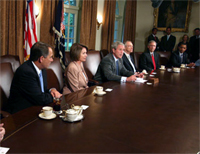|
A Financial Rescue Plan Takes Shape

 |
|
|
President George W. Bush meets with congressional leaders in the Cabinet Room at the White House on September 25, 2008. Photo by David Bohrer / White House. |
| Just two days after the House of Representatives voted down the $700 billion financial rescue plan and triggered a record fall by the Dow, the Senate passed a package brimming with sweeteners to attract enough supporters on a second go-round in the house. On Friday, the rescue bill was approved by the House and sent on to the president for his signature. AEI scholars have been reporting on the crisis and monitoring the shape and substance of the administration's proposal and the alternatives. While the administration's willingness to consider bold action was useful, many of the provisions in the package were cause for concern. Procedural and political considerations will dominate the discussions in the hours and days to come, and some hard questions need to be answered so that we are able to protect the financial system and taxpayers.
Click here for AEI scholars who are available to comment on the financial crisis.
Latest Books

|
|
Innovation and Technology Adoption in Health Care Markets
|
| By Tomas J. Philipson, Anupam B. Jena |
| Posted: Thursday, September 18, 2008 |
 |
|
Drill Here, Drill Now, Pay Less
|
| A Handbook for Slashing Gas Prices and Solving Our Energy Crisis |
| By Newt Gingrich, Vince Haley |
| Posted: Thursday, September 11, 2008 |
 |
|
The Future of Educational Entrepreneurship
|
| Possibilities for School Reform |
| Edited by Frederick M. Hess |
| Posted: Wednesday, August 27, 2008 |
 |
 |
| [More Books] |
|
 |
|
The American
|
 |
 The American magazine brings subscribers fresh and insightful coverage of business, economics, culture, and more. In the current issue, which is available on newsstands, Charles Murray offers unconventional wisdom on the purpose of a college education, Jonathan Yardley proposes a way to save newspapers, Nick Schulz and Arnold Kling discuss "the Sergey Brin economy," and Ben Casnocha reports on the Western frontier of tech entrepreneurship. The American also publishes exclusive web-only content--and articles from the magazine--at www.american.com. The American magazine brings subscribers fresh and insightful coverage of business, economics, culture, and more. In the current issue, which is available on newsstands, Charles Murray offers unconventional wisdom on the purpose of a college education, Jonathan Yardley proposes a way to save newspapers, Nick Schulz and Arnold Kling discuss "the Sergey Brin economy," and Ben Casnocha reports on the Western frontier of tech entrepreneurship. The American also publishes exclusive web-only content--and articles from the magazine--at www.american.com. |
|
|
|
On the Issues
|
 |
In the most recent installment of On the Issues, Norman J. Ornstein says that Seven years is enough time to create a plan to prevent the kind of chaos and injury that would come with a more successful attack on official Washington.
|
|
|

|
 |